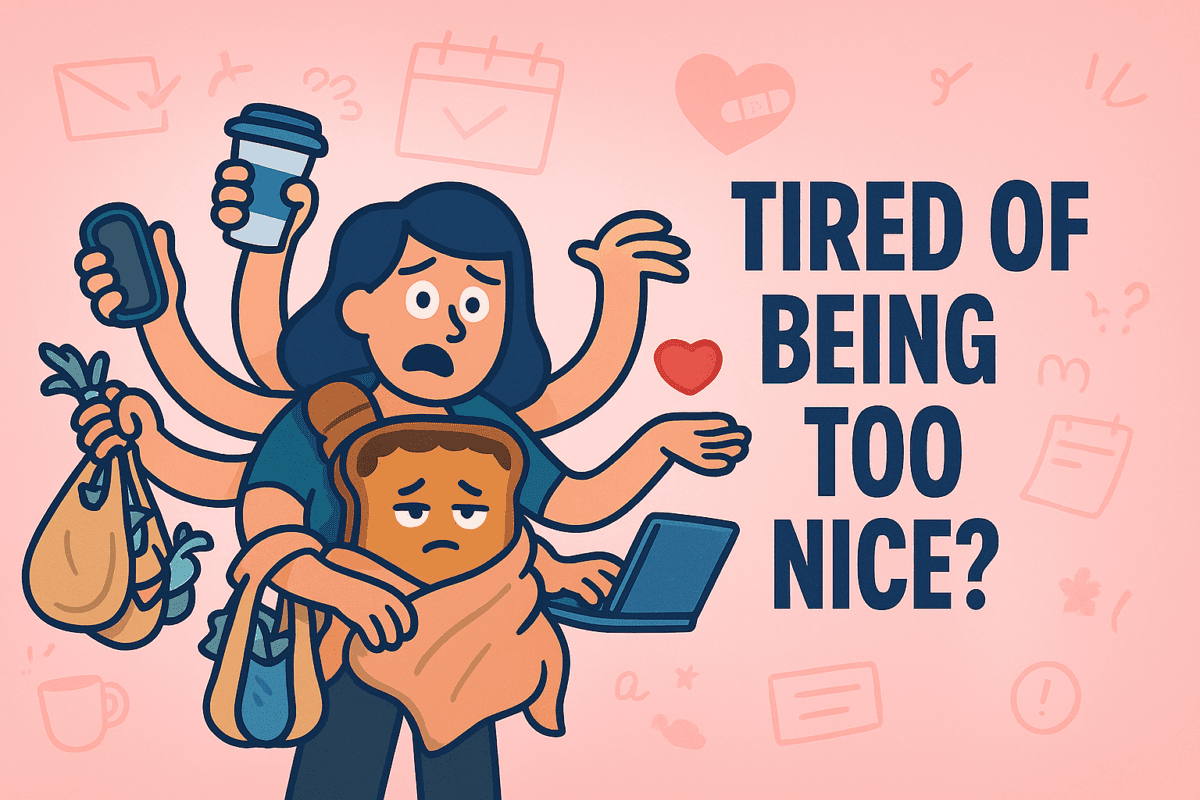
Stuck in the People-Pleasing Trap? Here’s How to Get Out
You know the routine. Smiling while your soul flatlines. Nodding while dying inside. Saying yes before your brain even logs the question. That’s not generosity. That’s burnout from being too nice wrapped in a nervous laugh and polite emoji.
If your emotional exhaustion is wearing a friendly face, and your self-worth is tied to being agreeable, available, and “easy,” this one’s for you.
TL;DR: Are You a Recovering People Pleaser?
-
You say yes while screaming no internally
-
You apologise when someone else steps on your foot
-
You dodge conflict like it’s a contagious rash
-
You have no idea what you want anymore
-
Saying no gives you anxiety sweats
You’re not being kind. You’re being conditioned.
Why People Pleasing Feels So Addictive
Because it works. For a bit.
You stay liked. You avoid drama. You feel useful. Until you’re burnt out, stretched thin, and Googling “people pleasing recovery” between rage naps.
Let’s be clear: being liked is not the same as being loved. And being useful is not the same as being valued.
5 Signs You’re Deep in the People-Pleasing Spiral
1. Your Schedule is a Shrine to Everyone Else
You move your life around for theirs. You cancel on yourself. You wear your exhaustion like it’s loyalty.
2. You Crowdsource Every Decision
“What do you think?” means you’ve lost touch with your own opinion. You outsource your instincts to the group chat.
3. Other People’s Emotions Are Your Full-Time Job
You monitor moods like a weather app. If someone’s upset, you blame yourself.
4. You’re Resentful But Silent
You smile while silently seething. You fold laundry like it owes you money. Your rage is subtle but powerful.
5. You Think Boundaries = Betrayal
Every “no” feels like you’re kicking a puppy. But boundaries aren’t betrayal. They’re self-respect.
What’s Really Going On
Underneath every yes-is-fine smile?
-
Fear of being disliked
-
Fear of being left out
-
Fear of being a burden
Here’s the punchline: none of those fears go away by turning yourself into a doormat.
How to Stop People Pleasing (Without Imploding)
1. Pause Before You Answer
Say, “Let me get back to you.” Break the auto-yes cycle. You’re allowed to think.
2. Practice Saying No Where It’s Safe
Small things. Easy ones. Build the boundary-setting muscle without the full-blown panic.
3. Let Someone Be Disappointed
You’re not ruining their life. You’re just not fixing it for them.
4. Question the Inner Critic
When your brain says, “You’re selfish,” respond: “Or maybe… I’m just tired.”
Real Talk: You Can’t Keep Being Everything for Everyone
Someone’s got to be there for you. And shocker: it might have to be you first.
Hold My Ducks is the burnout recovery book for the over-functioners, the quiet resenters, and the recovering people pleasers ready to scream “not today” into the void.
It doesn’t teach you how to be mean. It teaches you how to be honest, with yourself first.
Grab Hold My Ducks. A Burnout Recovery Book for People-Pleasers Who’ve Had Enough
Grab Hold My DucksWhy Setting Boundaries Feels So Damn Hard (And How to Start Anyway)
Setting boundaries feels like emotional skydiving without a parachute. Here’s why it’s so hard (especially for people-pleasers), and how to start without spiralling.
How to Say No Without Feeling Guilty (or Being a Bad Person)
If you say yes when you mean no, this is for you. Here’s how to say no without guilt, protect your energy, and stop emotionally imploding.
People Pleasing Recovery: How to Stop Saying Yes to Everyone But Yourself
Always saying yes, even when you want to scream? Learn how to stop people pleasing, set boundaries, and recover from emotional burnout.
How to Set Boundaries (Without Feeling Guilty or Explaining Yourself)
Setting boundaries feels hard, but staying burnt out feels worse. Here’s how to say no, protect your energy, and stop apologising for existing.
10 Signs You’re Heading for an Emotional Breakdown (And What to Do Before You Snap)
Feeling off, emotionally numb, or secretly fried? These 10 signs of emotional breakdown reveal you’re not lazy, you’re burnt out and need rest.
Mentally Cooked? 10 Symptoms of Mental Exhaustion (And What to Do About It)
Tired, overwhelmed, and calling yourself lazy? You might be dealing with mental exhaustion. Here’s how to spot the symptoms, and fix the spiral.







